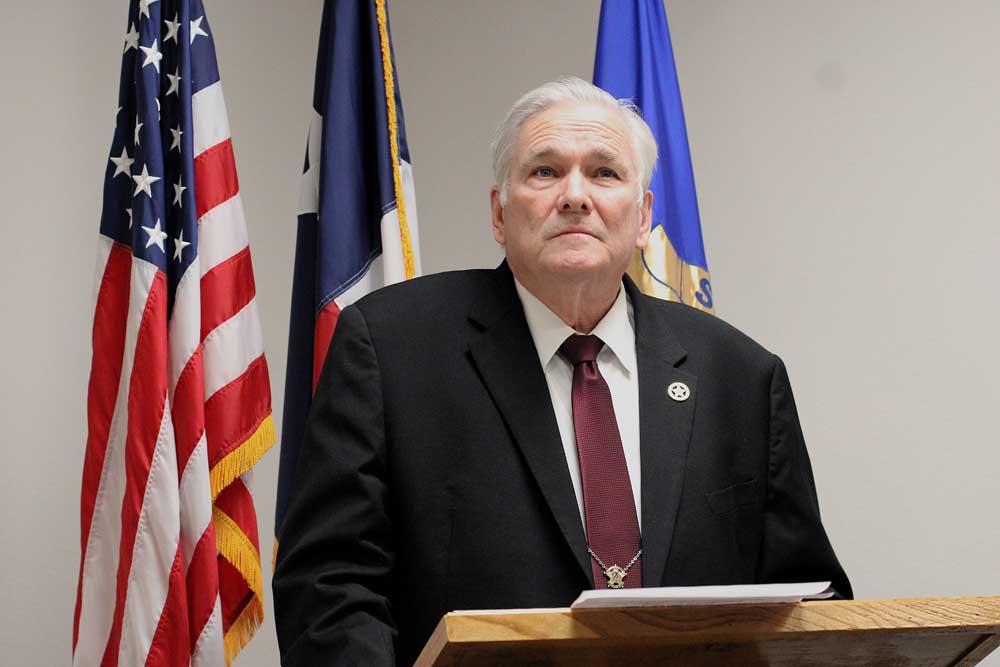Smith County sheriff clarifies immigration policies, addresses ‘lies’ circulating online
Published 7:00 pm Friday, February 14, 2025

- Smith County Sheriff Larry Smith speaks to local media during a press conference Friday afternoon at his office. (Jennifer Scott/Tyler Morning Telegraph)
Smith County Sheriff Larry Smith aimed late this week to set the record straight on his stance on immigration, first with an apology on Thursday evening followed by a press conference Friday afternoon.
The apology, posted to the sheriff’s office Facebook page, came nearly a week after Smith’s immigration panel/town hall comments sparked community discussion over his department’s immigration policies.
“In a rush to try to make matters better, unfortunately, I made some of those matters worse,” Smith’s apology said. “For that, I extend my sincere apologies to the citizens of Smith County, Gov. Greg Abbott, Tom Homan, and President Donald Trump.”
In the statement, Smith addressed the citizens of Smith County, stating that he is a “mortal human being who strives to always do what is right” but acknowledged that does not exempt him from “making mistakes.”
At a press conference Friday, Smith clarified his apology was mainly directed toward Abbott, of whom the sheriff said he has always been an ally. Smith pushed back against what he called false claims that he would “defy” Abbott and refuse to arrest undocumented immigrants.
“This is the farthest thing from the truth,” Smith said, holding up a printed copy of a Feb. 10 article published online by Current Revolt, a Texas-based media site covering state and local politics. “This is packed with lies and misinterpretations.”
In the apology, Smith described these accusations as “slanderous” and driven by an agenda. He urged residents to read his full remarks, which can be heard on live recordings published on local news sites and the sheriff office’s Facebook page, without what he described as “vicious spin” and “outright mistruths.”
The Current Revolt article alleges Smith “assured” the panel audience he would release undocumented immigrants “as soon as the buzzer hits 48 hours.” At Friday’s press conference, Smith clarified that if ICE does not pick up an offender within 48 hours, the county is required to release them. However, if the offender is being held for a serious crime, he said ICE will prioritize arresting the suspect.
Understanding the 48-hour hold
Under federal regulation, when local law enforcement arrest someone who may be in the country illegally, ICE can issue a detainer request, asking the jail to hold the person for up to 48 hours after they would normally be released.
This gives ICE time to take custody and begin immigration proceedings.
However, courts have ruled these holds are not mandatory, meaning local agencies can decide whether to comply. If ICE doesn’t take custody within that timeframe, excluding weekends and holidays, the person must be released unless they face other charges.
Jail space, arrest policies
At the panel, Smith said it is the policy of the Smith County Sheriff’s Department not to check immigration status of individuals detained, ticketed or arrested for a Class C misdemeanor — only those facing Class B misdemeanors or more serious charges.
In Smith County, if someone is stopped for a traffic ticket or anything less than a Class B misdemeanor, “there’s nothing to worry about — unless they run,” Smith said at the panel, referring to fleeing in a vehicle.
In Texas, a Class B misdemeanor is more serious than a Class C misdemeanor in Texas. A Class A misdemeanor is the most severe.
This point sparked questions throughout the panel, with many attendees asking for clarification.
Due to limited jail space, only individuals arrested for Class B misdemeanors or more serious offenses are detained while ICE is notified, Smith said on Friday.
“We have a policy in place to manage jail space,” Smith said. “We need to leave enough room to properly classify inmates, so the jail isn’t at full capacity. We also have inmates housed out of county, and we have to ensure we have enough space to manage that.
While jail space remains a concern, Smith emphasized the booking process for identifying undocumented individuals remains unchanged. He noted the department “does not profile” or ask random individuals in the community about their legal status.
Smith was questioned by Pct. 1 Commissioner Christina Drewry about these comments during Tuesday’s Smith County Commissioners Court meeting, specifically in relation to a grant application for rifle-rated body armor, which required compliance with Department of Homeland Security standards.
He restated that the sheriff’s office does not inquire about immigration status during routine interactions, such as traffic stops. However, through the department’s 287(g) jail detention model officers do check the immigration status of people arrested and booked into jail.
In 2012, Smith suspended the county’s 287(g) task force model, which shifted the responsibility of processing immigration detainers back to ICE. Soon, the task force model will be reimplemented, allowing sheriff’s offices and other agencies to be cross-designated and deputized by the federal government to participate in ICE operations.
The Smith County Sheriff’s Office will participate in this new program and has four personnel set to attend ICE training in South Carolina.
In a statement Friday, Drewry said while her concerns remain, she emphasized the importance of ensuring the safety of law enforcement. She noted she and other commissioners unanimously supported the application for a grant to fund rifle-rated body armor for the sheriff’s office.
“The border is a priority issue that Texans are very concerned about and that was made very clear during the election cycle,” Drewry said. “Our citizens want to know that their sheriff is going to implement the Trump Administration’s policies to the letter so we can live in a safer Smith County and our tax dollars are not being abused.”
Response from community members
During immigration panel livestreams and in the aftermath of the panel, hundreds of East Texans voiced their opinions on Smith’s statements. Some expressed support, while others offered criticism. Many left with more questions and used the platform to engage in discussion.
“I stand by everything that was said,” Smith said of the panel. “I did mischaracterize, not intentionally.”
Tyler resident Emily Pinal said, in her opinion, Smith’s apology statement was insulting to those who organized and advocated for him. While she wasn’t surprised he addressed his supporters, she felt his apology letter overlooked people of color within the immigrant community.
“He’s basically backtracking on everything and why? Because he knows that the people who voted for him are holding him accountable right now to what they really want,” Pinal said.
She advises people to stay informed, attend ‘know your rights’ clinics and organize for future elections.
“Tune into these organizations that are speaking of not just voting but advocating for yourself and whatever that looks like to you,” Pinal said. “I think it’s just time — more than ever— to really get familiar with how it all affects our community.”
Tyler-based immigration lawyer Ginger Young was surprised to see Smith being called out by other outlets for not following the law because she knows him to be the “bluest of the blue.” Young said the panel was intended to inform the undocumented community and their families; they do not need to be scared to report crimes.
“Many of the people undocumented are property owners. They pay taxes. In this county, they pay a lot of taxes, and whether or not you’re a taxpayer, if you live in this county, (Smith’s) job is to protect you as victims,” Young said. “He wants people to report crimes, and he can’t do his job and protect this county, if people aren’t reporting crimes.”
Young believes Smith’s intentions behind the panel were honest and said he was clear on his stance that anyone who commits a crime will be held accountable.
Young emphasized the role of the sheriff is to enforce the law. However, each department has some discretion on whether to give a citation or arrest. This is why enforcement of traffic stop violations varies department by department.
“[Smith] is the head law enforcement officer in this county for a reason, because he does enforce the law, and regardless of what’s being said on social media, he will continue to enforce the law. Don’t break the law, you won’t have any trouble,” Young said.
Response to lawsuits, removal efforts
In an opinion article, Chris Russo, president of Texans for Strong Borders, a conservative citizens advocacy group, argued some of Smith’s comments could potentially violate Texas’ Sanctuary Jurisdictions law, which was enacted as SB 4 by the Texas Legislature in 2017.
The Texas Government Code states local law enforcement agencies are not allowed to adopt policies that limit or prevent them from enforcing immigration laws. It also requires them to inquire about the immigration status of people detained or arrested and share that information with federal authorities, like the U.S. Immigration and Customs Enforcement.
Local police and other law enforcement officials must cooperate with federal immigration enforcement and cannot restrict or avoid doing so. If they do, it may violate state law.
Russo said Texans for Strong Borders is aware of some Smith County residents who have filed complaints with the Office of the Texas Attorney General regarding these statements.
The Tyler Morning Telegraph reached out to the AG’s office to inquire if any complaints have been formally filed with the state. Reporters did not hear back by Friday evening but will update this article when more information is provided.
Smith dismissed efforts, including on online petition, to remove him from office as baseless, calling them “hogwash” and “smoke and mirrors.”
“They can file whatever lawsuits they want,” he said. “Some of the claims are completely false, like saying I wasn’t bonded when I have a copy of my bond in my office, or that I need a driver because I can’t drive. If enforcing the law means I have to take this heat, so be it. I’ve got broad shoulders. Filing a lawsuit against me doesn’t bother me; it’s not the first time.”






